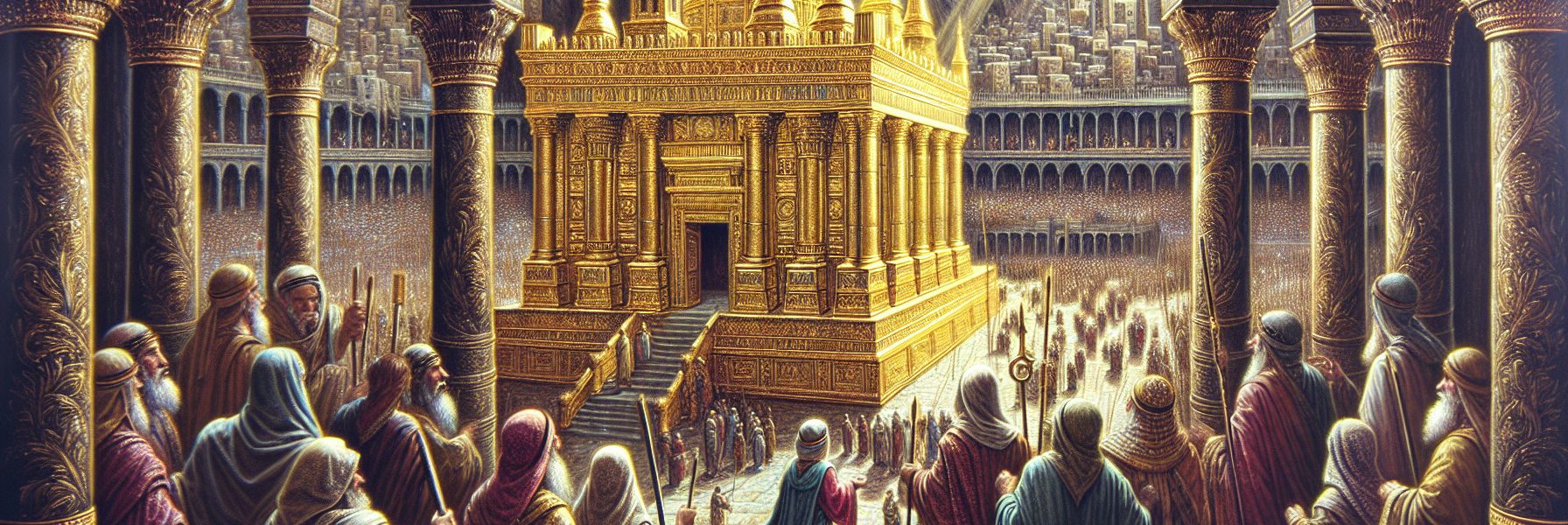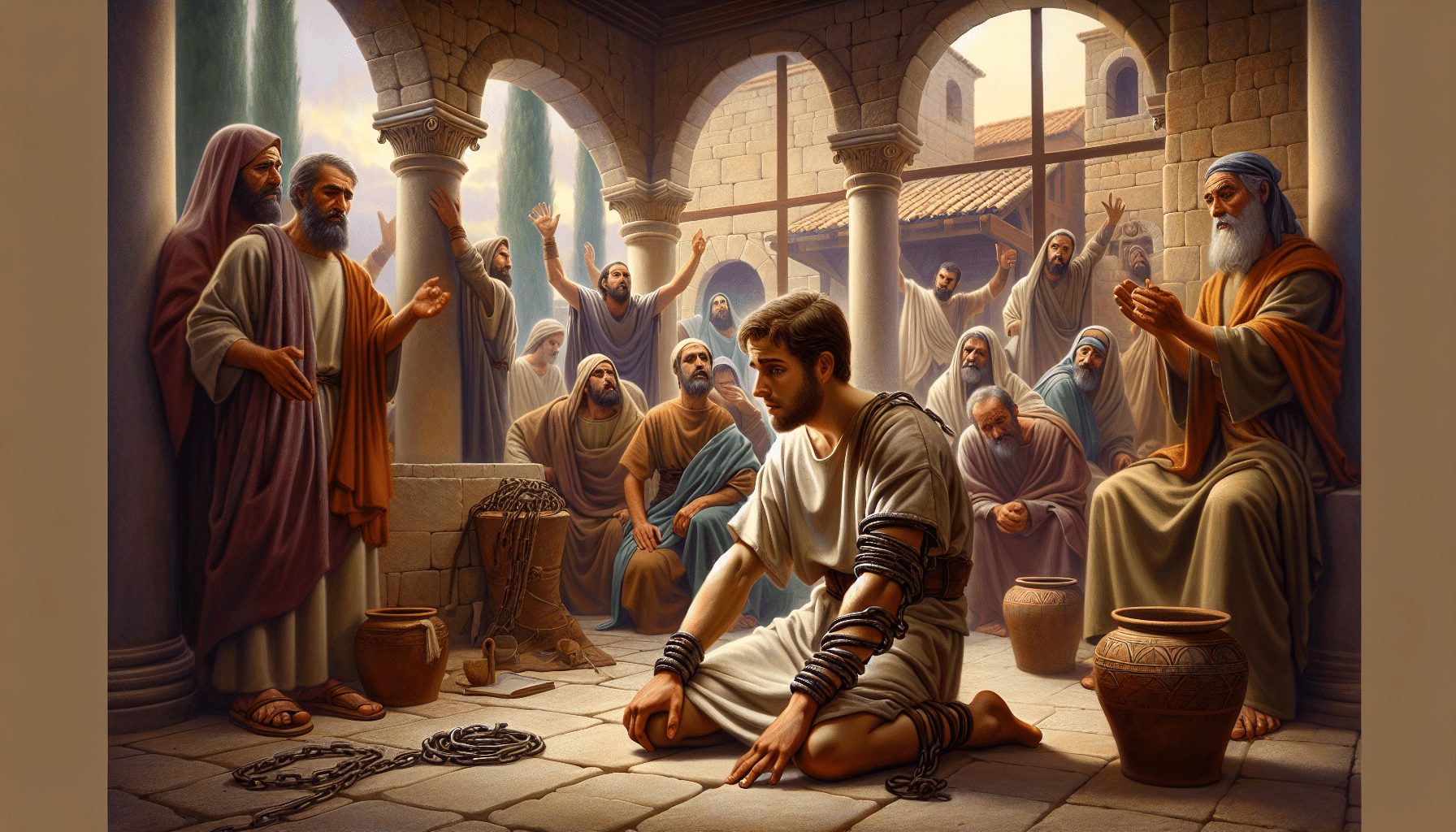Azariah’s Pride and the Fall of a King (Note: This title is 42 characters long, within your 100-character limit, and removes all symbols and quotes.)
**The Reign of Azariah: A King’s Pride and God’s Judgment**
In the twenty-seventh year of Jeroboam, king of Israel, Azariah son of Amaziah began to reign over Judah. He was but sixteen years old when the weight of the crown was placed upon his brow, yet the people looked to him with hope, for his father had once walked in the ways of the Lord, though not with a perfect heart.
Azariah, whose name meant “The Lord has helped,” ruled from Jerusalem, the city of David, where the golden Temple stood as a beacon of God’s presence. The young king sought the Lord in his early years, and under the guidance of the priests and the prophet Zechariah, he did what was right in the eyes of the Lord, just as his father Amaziah had done. The land flourished under his reign, for the Lord blessed Judah with abundant harvests and peace from their enemies. The walls of Jerusalem stood strong, and the people rejoiced, for they saw the favor of God upon their king.
Yet, as the years passed and Azariah’s power grew, so too did the pride in his heart. He forgot that his strength came not from his own might but from the hand of the Almighty. One fateful day, against the warnings of the high priest and the counsel of the elders, Azariah entered the Temple of the Lord to burn incense upon the altar—a sacred duty reserved only for the priests, the sons of Aaron. His heart swelled with arrogance, believing that his royal authority granted him privileges above the Law of Moses.
As the sweet-smelling smoke curled upward, Azariah stood before the golden altar, his robes gleaming, his crown reflecting the flickering light of the sanctuary lamps. But the Lord would not tolerate such defiance. Suddenly, the high priest Azariah—a man of courage and faith—rushed into the Temple with eighty priests of the Lord, their faces filled with righteous fury.
“King Azariah!” the high priest cried, his voice echoing through the holy place. “It is not for you to burn incense before the Lord! Only the consecrated priests may do so! Leave the sanctuary at once, for you have trespassed against the Lord, and He will strike you!”
Before the words had fully left the priest’s lips, the hand of God fell upon the king. A ghastly whiteness spread across Azariah’s forehead—leprosy, the dread disease that would mark him as unclean for the rest of his days. The priests gasped, and Azariah staggered back, his hands trembling as he beheld the judgment of the Lord.
From that moment, the king was an outcast in his own palace. He was hurried from the Temple, never again to enter its sacred courts. His son Jotham was appointed to govern the people, while Azariah dwelt in a separate house, his face covered, his body rotting with the affliction God had placed upon him.
Yet even in judgment, the Lord was merciful. Though Azariah was stricken, the kingdom of Judah remained intact. Jotham ruled wisely in his father’s stead, and the people continued to offer sacrifices at the Temple, though their king could no longer stand among them.
In the thirty-eighth year of his reign, Azariah breathed his last, his body ravaged by leprosy, his pride humbled. They buried him in the City of David, but not among the tombs of the honored kings, for his sin had left a stain upon his legacy.
And so the word of the Lord was fulfilled: He opposes the proud but gives grace to the humble.
—
**Meanwhile, in the North: The Bloody Turmoil of Israel’s Kings**
While Azariah ruled—and later suffered—in Judah, the kingdom of Israel spiraled deeper into chaos and bloodshed. The word of the Lord had declared that the house of Jehu would reign only to the fourth generation, and so it came to pass.
Zechariah, son of Jeroboam, ascended the throne in Samaria, but his reign lasted but six months. Like his fathers before him, he did evil in the sight of the Lord, clinging to the golden calves at Bethel and Dan, leading Israel deeper into idolatry. Then Shallum, son of Jabesh, conspired against him, striking him down before the people and seizing the throne.
But Shallum’s triumph was short-lived. Just one month after his treachery, Menahem, a ruthless commander from Tirzah, marched upon Samaria, slaughtering Shallum and all who supported him. Menahem then turned his wrath upon the city of Tiphsah, which had refused to submit to him. He ripped open the pregnant women and dashed their infants against the rocks, a horror that stained the land with innocent blood.
For ten years, Menahem ruled Israel with an iron fist, yet even he sought legitimacy. When Pul, king of Assyria, threatened invasion, Menahem extorted a thousand talents of silver from the wealthy men of Israel to buy the Assyrian’s favor. The heavy burden fell upon the people, and they groaned under oppression.
At his death, his son Pekahiah took the throne, but he fared no better. After two years, his own captain, Pekah son of Remaliah, assassinated him in the citadel of the royal palace, taking the crown for himself.
Thus, Israel’s kings rose and fell like weeds in a storm, each more wicked than the last. The word of the prophet Hosea rang true: “They sow the wind, and they shall reap the whirlwind.”
Yet in Judah, though Azariah had fallen, a flicker of hope remained. For the Lord had promised that the scepter would not depart from the line of David until the coming of the One who would reign forever. And so the people waited, even in darkness, for the dawn of redemption.




